September 2023

We create avenues for the industry to gain more insights into emerging trends, industry-specific problems of national importance, and global best practices in logistics & supply chain management. We enable the industry to cut down transaction costs, increase efficiency, and enhance profitability. We are committed to sensitizing the industry about macro-level issues and helping find solutions to them.
News highlights from the world of supply chain and logistics that appeared in media over the last one month
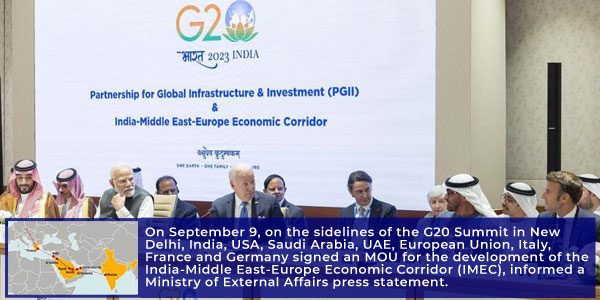
|
| On September 9, on the sidelines of the G20 Summit in New Delhi, India, USA, Saudi Arabia, UAE, European Union, Italy, France and Germany signed an MOU for the development of the India-Middle East-Europe Economic Corridor (IMEC), informed a Ministry of External Affairs press statement. The IMEC, consisting of an Eastern Corridor connecting India to the Gulf region and a Northern Corridor connecting the Gulf region to Europe, will include a railway and ship-rail transit network and road transport routes, it added. Prime Minister Shri Narendra Modi, in his remarks at the occasion, highlighted the importance of physical, digital and financial connectivity and added that IMEC would help promote economic integration between India and Europe. The Indian Express and the Hindu newspapers published features explaining the development and its likely implications on the supply chains of India and the world. Appreciating the development, Engineering Exports Promotion Council India (EEPC India), the leading trade and investment promotion organization for the engineering sector, stated that the IMEC will “prove to be a game-changer project and provide huge impetus to global trade.” EEPC India chairman Shri Arun Kumar Garodia remarked that the corridor will help redefine the movement of goods and services across the continents as it will bring down logistics costs and ensure quicker delivery of shipments. |
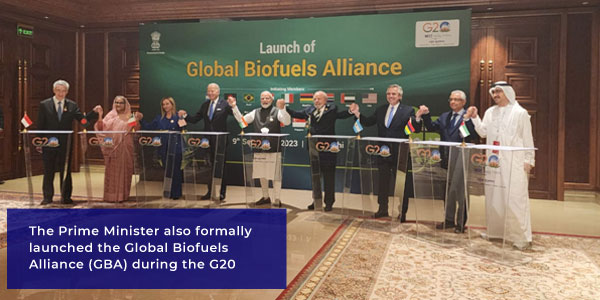
|
| The Prime Minister also formally launched the Global Biofuels Alliance (GBA) during the G20 Summit. The India-led initiative aims to facilitate international co-operation, accelerate the use of sustainable biofuels, promote global biofuels trade and provide technical support for national biofuel programs, reported the Indian Express. The GBA's member countries include the US, Brazil, Argentina, Bangladesh, Italy, Mauritius, South Africa, and the UAE. |
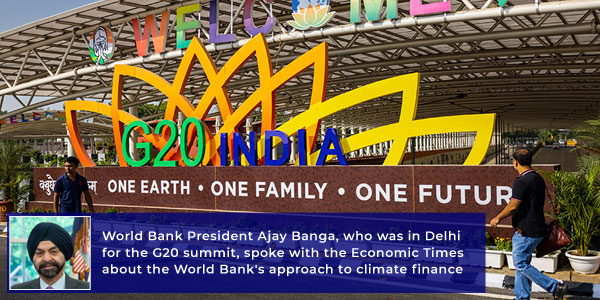
|
| World Bank President Ajay Banga, who was in Delhi for the G20 summit, spoke with the Economic Times about the World Bank's approach to climate finance, and shared his perspectives on G20's Delhi Declaration consensus and India's economic growth. "India has got a lot of things right," Mr. Banga said, expressing optimism about the country's leadership position because global leaders joined hands during the summit and showed a willingness to collaborate on different parts of the declaration. He said that India along with all the G20 members deserve credit for this decision. |
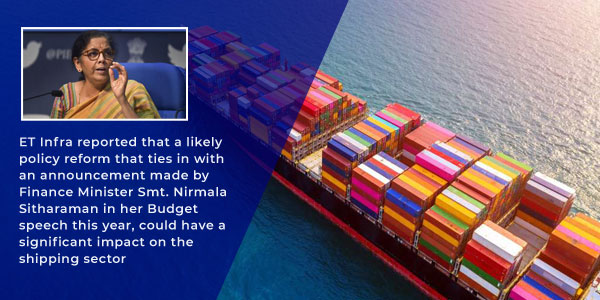
|
| ET Infra reported that a likely policy reform that ties in with an announcement made by Finance Minister Smt. Nirmala Sitharaman in her Budget speech this year, could have a significant impact on the shipping sector. The reform pertains to a cabotage rule that applies to cargo ships that ply on local routes. The move, aimed at promoting coastal shipping, when likely implemented, will allow foreign registered/flagged ships to do business along the country’s coast without securing a license from the Directorate General of Shipping, said the ET report. |
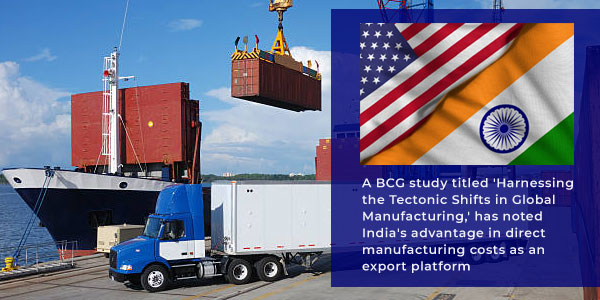
|
| A BCG study titled 'Harnessing the Tectonic Shifts in Global Manufacturing', has noted India's advantage in direct manufacturing costs as an export platform. It stated that India could be "winning the global manufacturing battle as supply chains shift away from China," reported the Times of India. The report added that the average cost of Indian-made goods imported into the US is 15 per cent lower compared to locally manufactured goods. During the last five years, Indian exports to the US soared by $23 billion, marking a 44 per cent increase from 2018 to 2022. In contrast, China experienced a 10% drop in its exports to the US, per the study. The BCG study covered the transformation seen in manufacturing and sourcing across various industries which has been shaped by factors such as trade disputes, the pandemic, geopolitical tensions, and supply chain disruptions. |
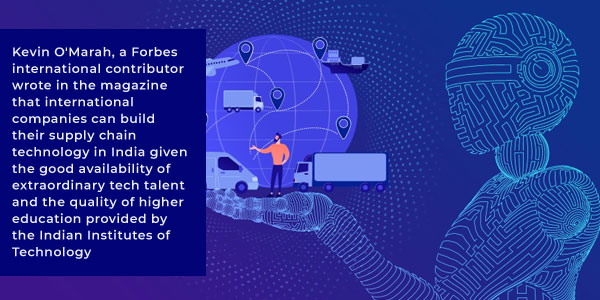
|
| Kevin O'Marah, a Forbes international contributor wrote in the magazine that international companies can build their supply chain technology in India given the good availability of extraordinary tech talent and the quality of higher education provided by the Indian Institutes of Technology. "Indian supply chain job descriptions are more than twice as likely to require analytics skills than any other geography," he wrote, adding that such locally advertised jobs are four times as likely to ask for skills in AI/ML or software engineering. "The road to building your supply chain tech runs through Bangalore," he stated. |
INTERNATIONAL
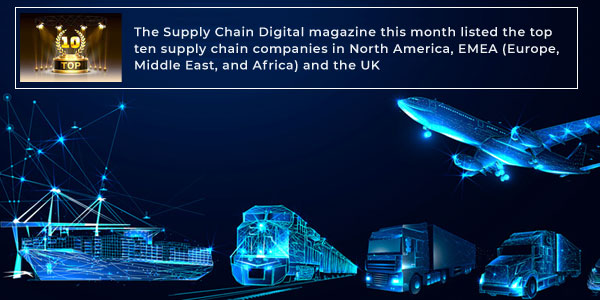
|
||||||||||||||||
| The Supply Chain Digital magazine this month listed the top ten supply chain companies in North America, EMEA (Europe, Middle East, and Africa) and the UK based on parameters like supply chain strategy, supplier relationship management, cost-efficiency, growth and industry influence. The top 10 supply chain companies in North America included Amazon, Microsoft, Apple, IBM, Oracle, J&J, Proctor & Gamble, Coca-Cola, PepsiCo and Cisco Systems. The top ten supply chain companies in EMEA and the UK region included Deloitte, EY, Siemens, L’Oréal, Schneider Electric, BP, SAP, IKEA, BMW, and AstraZeneca. | ||||||||||||||||
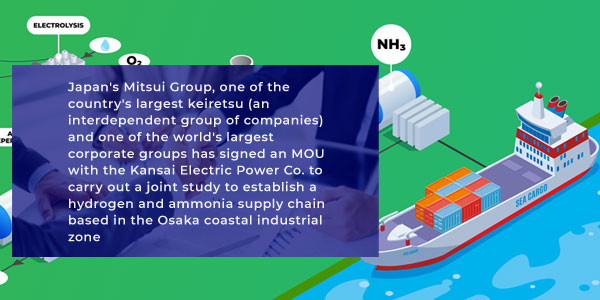
|
||||||||||||||||
| Japan's Mitsui Group, one of the country's largest keiretsu (an interdependent group of companies) and one of the world's largest corporate groups has signed an MOU with the Kansai Electric Power Co. to carry out a joint study to establish a hydrogen and ammonia supply chain based in the Osaka coastal industrial zone. Hydrogen and ammonia, when used as energy sources, do not emit CO2 during combustion, and therefore they are used to achieve carbon neutrality. The article reported that the companies will study the development of bases for receiving, storing, and supplying ammonia in the Osaka coastal industrial zone, and conduct surveys to expand the use of ammonia in the Kansai and Setouchi regions. | ||||||||||||||||
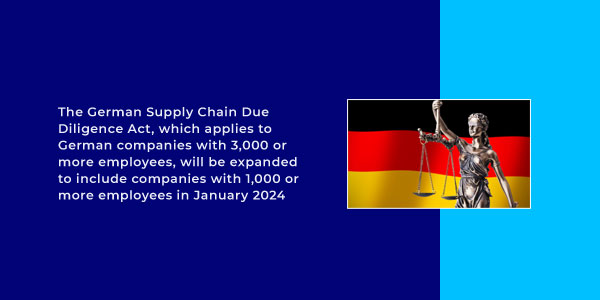
|
||||||||||||||||
| The German Supply Chain Due Diligence Act, which applies to German companies with 3,000 or more employees, will be expanded to include companies with 1,000 or more employees in January 2024, informed an article published by SHRM, a US-based international HR association. Germany's Supply Chain Due Diligence Act requires German companies to make sure that their international suppliers have high standards regarding health and environmental safety. A major influence on the act's formation was Bangladesh's horrific Rana Plaza garment factory catastrophe which killed more than a thousand people. The article reported that in the aftermath of the tragedy, it was found that the factory was a link in the supply chains of many major European clothing stores and brands. Soon after, Bangladesh created the Accord on Fire and Building Safety and encouraged international companies to sign it. Germany's Supply Chain Due Diligence Act makes it mandatory for German companies, once they identify any risks in the supply chain, to take preventive or remedial measures toward mitigating that risk. | ||||||||||||||||
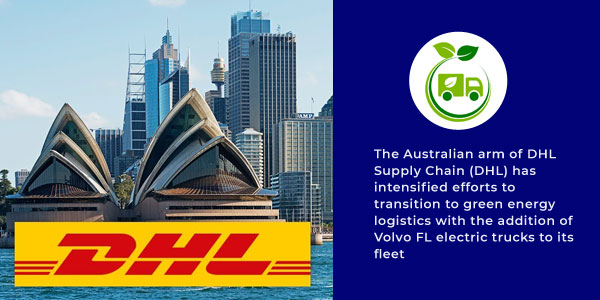
|
||||||||||||||||
| The Australian arm of DHL Supply Chain (DHL) has intensified efforts to transition to green energy logistics with the addition of Volvo FL electric trucks to its fleet. The medium-duty Volvo FL fitted with second-gen battery packs will help the Group achieve its target of 60 per cent electric vehicles in its last-mile fleet in Australia by 2030. The report stated that the Volvo FL combines a 600-volt motor with a two-speed transmission to deliver a 5500kg payload equipped with a regenerative braking system and transmission technology. “Globally, DHL Supply Chain has a strong understanding of the climate crisis and a head-start in reducing the environmental impact of its operations,” DHL Supply Chain CEO Steve Thompsett said on the occasion. | ||||||||||||||||

|
||||||||||||||||
| An American healthcare journal chronicled the views of sector leaders on how advanced technologies like artificial intelligence, 3D printing and drone delivery are set to shape and change the future of hospital supply chains. Top supply chain leaders from healthcare organizations such as Cedars-Sinai (Los Angeles), Kettering Health Network (Ohio), and Ochsner Health (New Orleans) joined the discussion to talk about advancements in the health supply chain such as personalized medicine, remote patient monitoring and eco-friendly practices. | ||||||||||||||||
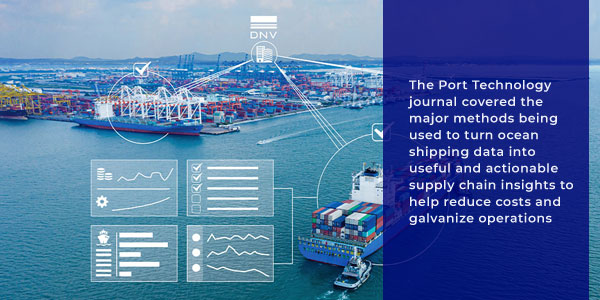
|
||||||||||||||||
| The Port Technology journal covered the major methods being used to turn ocean shipping data into useful and actionable supply chain insights to help reduce costs and galvanize operations. Recommended measures included identifying gaps, data silos, and multimodal disconnects in ocean shipping and addressing them using digitalization, dashboards, and advanced analytics. The article said that end-to-end visibility across modes and handoffs can minimize unnecessary demurrage and detention fees and vastly improve the quality of customer service. | ||||||||||||||||
|
||||||||||||||||
Will connect again next month, with a comprehensive dossier of news, trends and events from the industry.
| Courtesy: Newsletter content developed by Mr. Aanand Pandey | ||
